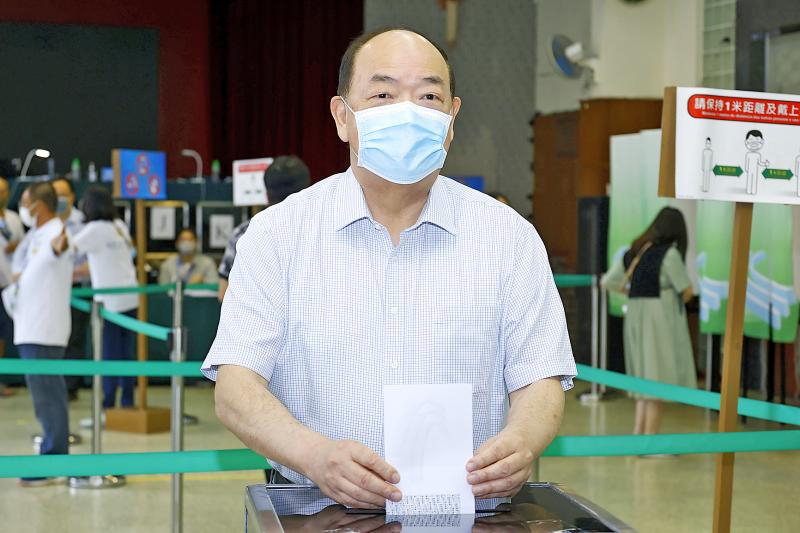Macau’s pro-democracy camp has lost further ground in the territory’s legislature, according to preliminary results yesterday from an election marred by low turnout and a ban on “disloyal” candidates.
Authorities in Macau had disqualified 21 candidates — most of them from the pro-democracy camp — from Sunday’s election on national security grounds.
They were accused of disloyalty to China after they commemorated the victims of the 1989 Tiananmen Square Massacre and honored rights advocate and Beijing critic and Nobel Peace Prize laureate Liu Xiaobo (劉曉波).

Photo: AP / Macau Government Information Bureau
Of the 33 seats in Macau’s Legislative Assembly, 14 are directly elected and a preliminary count yesterday showed that the pro-democracy camp won just two — half of what it got in the previous vote in 2017.
The other 19 lawmakers include 12 indirectly chosen from professional sectors and seven appointed by Macau’s chief executive.
The general turnout of just over 42 percent was the lowest since the territory was handed over to China in 1999, but authorities dismissed suggestions that it was caused by the disqualification of pro-democracy candidates.
Macau Electoral Affairs Committee President Tong Hio Fong (唐曉峰) blamed the low level of participation on COVID-19 restrictions, hot weather and heavy rain.
The disqualification of pro-democracy candidates in Macau followed similar rulings in Hong Kong, where authorities have moved to crush dissent and the territory’s pro-democracy movement with a National Security Law and a radical electoral overhaul.

MAKING WAVES: China’s maritime militia could become a nontraditional threat in war, clogging up shipping lanes to prevent US or Japanese intervention, a report said About 1,900 Chinese ships flying flags of convenience and fishing vessels that participated in China’s military exercises around Taiwan last month and in January have been listed for monitoring, Coast Guard Administration (CGA) Deputy Director-General Hsieh Ching-chin (謝慶欽) said yesterday. Following amendments to the Commercial Port Act (商港法) and the Law of Ships (船舶法) last month, the CGA can designate possible berthing areas or deny ports of call for vessels suspected of loitering around areas where undersea cables can be accessed, Oceans Affairs Council Minister Kuan Bi-ling (管碧玲) said. The list of suspected ships, originally 300, had risen to about 1,900 as

Right-wing political scientist Laura Fernandez on Sunday won Costa Rica’s presidential election by a landslide, after promising to crack down on rising violence linked to the cocaine trade. Fernandez’s nearest rival, economist Alvaro Ramos, conceded defeat as results showed the ruling party far exceeding the threshold of 40 percent needed to avoid a runoff. With 94 percent of polling stations counted, the political heir of outgoing Costa Rican President Rodrigo Chaves had captured 48.3 percent of the vote compared with Ramos’ 33.4 percent, the Supreme Electoral Tribunal said. As soon as the first results were announced, members of Fernandez’s Sovereign People’s Party

MORE RESPONSIBILITY: Draftees would be expected to fight alongside professional soldiers, likely requiring the transformation of some training brigades into combat units The armed forces are to start incorporating new conscripts into combined arms brigades this year to enhance combat readiness, the Executive Yuan’s latest policy report said. The new policy would affect Taiwanese men entering the military for their compulsory service, which was extended to one year under reforms by then-president Tsai Ing-wen (蔡英文) in 2022. The conscripts would be trained to operate machine guns, uncrewed aerial vehicles, anti-tank guided missile launchers and Stinger air defense systems, the report said, adding that the basic training would be lengthened to eight weeks. After basic training, conscripts would be sorted into infantry battalions that would take

GROWING AMBITIONS: The scale and tempo of the operations show that the Strait has become the core theater for China to expand its security interests, the report said Chinese military aircraft incursions around Taiwan have surged nearly 15-fold over the past five years, according to a report released yesterday by the Democratic Progressive Party’s (DPP) Department of China Affairs. Sorties in the Taiwan Strait were previously irregular, totaling 380 in 2020, but have since evolved into routine operations, the report showed. “This demonstrates that the Taiwan Strait has become both the starting point and testing ground for Beijing’s expansionist ambitions,” it said. Driven by military expansionism, China is systematically pursuing actions aimed at altering the regional “status quo,” the department said, adding that Taiwan represents the most critical link in China’s